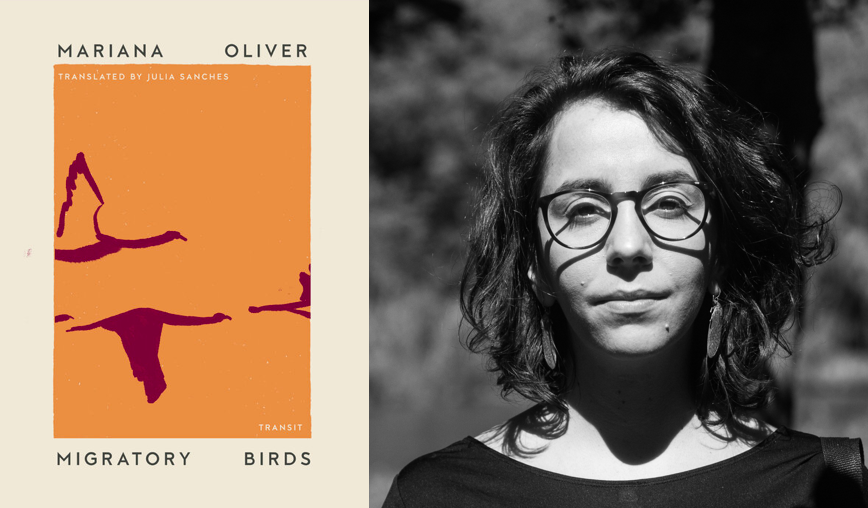
In 2017, a podcast from Letras Libras, a literary magazine published in Mexico and Spain, aired the essay “Aves Migratorias” contemplating the journeys of Bill Lishman. In his homemade aircraft, the artist and aviator featured in the film Fly Away Home settled into a self-propelled seat in the sky to lead a migration of Canadian geese. New to Newport and scouting potential projects for translation, Julia Sanches listened to the segment in her apartment, enrapt as the author Mariana Oliver read her work: “Algunas veces, de manera inesperada, es posible anticipar fragmentos del futuro en un momento.” Sanches heard how the words might sound taking flight in another form: “Sometimes, out of the blue, you catch a glimpse of the future.”
Born in São Paulo, Sanches moved to Manhattan when she was three months old on account of her father’s employment with a multinational corporation. From their apartment west of Central Park, Sanches’ mother walked with her through the American Museum of Natural History and the Metropolitan Museum of Art. She babbled with strangers on the city’s public transit, and often returned to the family’s rental unit having lost a shoe during her day’s outings. Her parents’ social circle centered around other Brazilians, and they returned to Brazil annually to visit family.
When Sanches’ family moved to the suburbs of New Jersey, followed by New York’s Hudson Valley, her mother hesitated to welcome friends into their house. She heard Americans were litigious, and also worried she might serve her guests the wrong meal. When Sanches traveled to Brazil, her cousins called her “gringa” — foreigner. She would fall silent their first week back, then engage fluently in Portuguese. The inverse happened in Englsh upon returning to the U.S.
When Sanches was eight, her family moved to Mexico City, where they lived for five years. The summer before September 11, 2001, they returned to New York’s Hudson Valley for “some consistency,” her parents said. After several months Sanches recalled as “not a fun time to be a foreigner in America,” her family relocated to Switzerland where she spent her teenage years.
“I hadn’t stepped foot in Europe,” said Sanches. “I may have even confused it with Sweden for a while.”
In high school, Sanches added French and Italian to her knowledge of English, Portuguese, and Spanish. After undergraduate studies at the University of Edinburgh in Scotland, she pursued a master’s degree in literature and translation at Universitat Pompeu Fabra in Barcelona where she picked up Catalan, the primary language of Catalonia, an autonomous community in Spain. As the country struggled with a years-long economic crisis, Sanches read young adult book manuscripts in English for a publishing house and wrote “reader’s reports” in Spanish for their eventual publication in Catalan. She then tried her lot with the publishing industry in New York. Moving to Brooklyn, Sanches stepped into a role as an assistant at the Wylie literary agency.
Sanches hadn’t stepped foot in Rhode Island before she and her partner moved to Newport in 2017 when he accepted a role as an art conservator for a regional nonprofit. They found a more welcoming community in PVD, buoyed by the comfort of living in a city where nearly 44% of the population traces family origins to Central and South America. While focusing primarily on her literary translations, Sanches worked part-time at Riffraff, a bookstore and bar in Olneyville.
After her introduction to Mariana Oliver’s writing through the Letras Libras podcast, Sanches tracked down her manuscript published by the Mexican Ministry of Culture as part of a project developed to support the country’s writers 35 years old and younger. Several U.S. literary journals turned down Sanches’ initial translation of the opening essay on Lishman’s aerial feat, but a friend and fellow translator Charlotte Whittle, who completed her master’s degree at Brown University, commissioned Sanches to translate another of Oliver’s essays for the online magazine Words Without Borders for an edition on the theme of “wandering and isolation.”
In Oakland, California, co-founder of independent publisher Transit Books Adam Levy read Sanches’ translation in Words Without Borders. Levy and Sanches had overlapped briefly at the Wylie Agency, and he reached out to commission a complete translation of Oliver’s work. Throughout the process, Sanches and Oliver messaged almost daily on WhatsApp around editorial nuance. In one case, Sanches grappled with an excerpt where Oliver intentionally used Spanish words derived from Arabic origins like aceituna and naranja. Because the English equivalents of olive and orange stemmed from non-Arabic roots, she opted for apricot and tangerine instead. Oliver asked Sanches to leave a voice message reading the copy aloud, so she could compare the cadence of the language. In 2021, Transit published Migratory Birds.
On March 4, PEN America awarded Sanches its annual PEN Translation Prize for her rendering of Oliver’s work. The judges wrote: “Migration is as natural to humans as to so many species of birds, but we have never before read such a light yet profound illustration of this principle as in Migratory Birds, brought to new audiences in Sanches’ outstanding translation.”
As the announcement took place at a ceremony in New York, Sanches was fast asleep late at night in Barcelona on a residency program in preparation for translating the 1977 novel El temps de les cireres by Montserrat Roig. Oliver live streamed the awards in Mexico, sending videos and messages of her celebration to Sanches as digital packets in flight across the Atlantic.
“It’s possible that the reason I was so drawn to this book has to do with its expansive geography, and its mirroring of my own experience of the world, in a way,” said Sanches.
“There is no place more like home for me than spaces of multiplicity and in-betweenness.”
Julia Sanches’ translation of Mariana Oliver’s essay collection Migratory Birds was published by Transit Books.